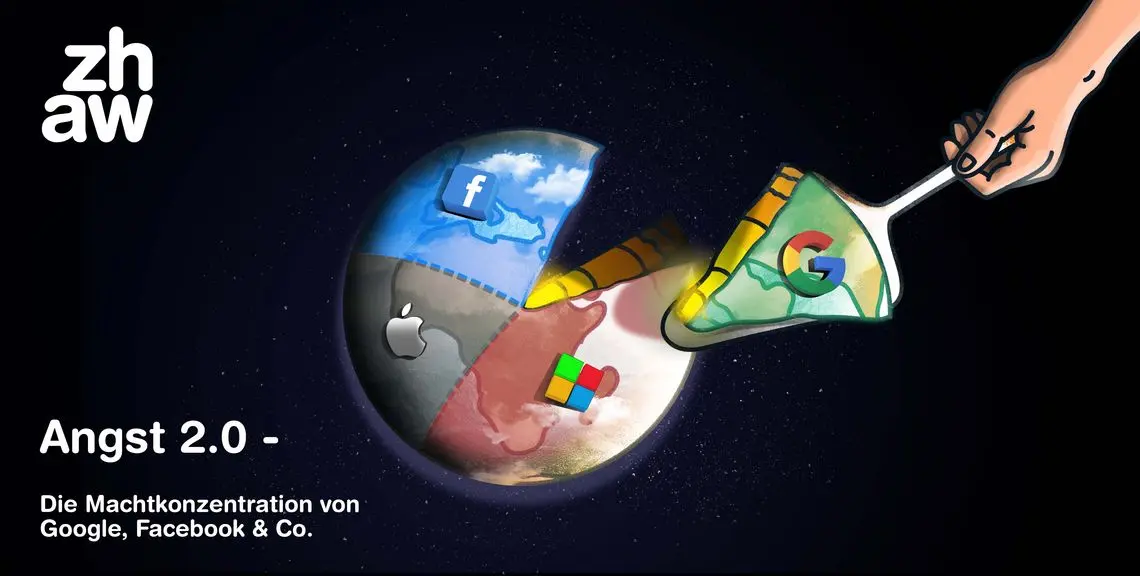Angst 2.0: How big and powerful are Google, Facebook and other big tech companies really?
Despite the recent outage from Facebook and WhatsApp, the concentration of power among a few large tech companies appears greater than ever. How strongly do Google and Co. influence our consumer behaviour and lives? Nicole Büttner, Peter Leppelt and Darius Zumstein take a cautious but optimistic look at the future.

As part of the "Privacy and Democracy" event series, the ZHAW invited Nicole Büttner, Peter Leppelt and Darius Zumstein as three keynote speakers to talk about the concentration of power by big tech companies like Google and Facebook. Hardly anyone gets past these companies in everyday life. As a consequence, we give them an enormous influence on our private lives but also on politics and the economy with our consumer behaviour.
Are our fears completely unfounded?
Darius Zumstein, a lecturer at the Institute of Marketing Management at the ZHAW School of Management and Law, views the topic through "digital marketing glasses”. He believes the fears of tech corporations are mostly unfounded, because every company has a great interest in using their data in the interests of the users. "A company has to deal with data in a trustworthy way, and most of the time they do," Zumstein explained in his keynote speech. He added that it is risky for "black sheep" to not act in a data protection-compliant manner, as customers can switch to the competition at any time if their data is not handled in a trustworthy manner. Zumstein therefore also emphasised the need for alternatives to counteract the monopoly position of a few companies. International cooperation is also important in this regard, he said. "Tech giants cannot be regulated locally, but only collectively across the planet," Zumstein said.
Ethics is more important than compliance
Peter Leppelts approaches were a counterpoint to Zumstein's confident theses. The company founder and consultant for IT security, data protection and corporate culture explained IT development processes in a generally understandable way. He explained that lawyers often have a problem understanding complex IT contexts. Because companies, in turn, want to spend as little as possible on data protection and, in particular, on software development, the IT industry responds by offering short-term and inadequate solutions. Politicians also play a decisive role here, he said, because they prefer short-term solutions. "Ethics is more important than compliance, and all industries should keep that in mind," Leppelt said. As an example, he cited the German "luca" app for contact tracing, which was "torn to shreds" by many security experts shortly after its release, but is nevertheless funded and used in many German states.
His outlined solution lies in creating political incentives for long-term thinking and honouring more objective and neutral expertise. "The sensible way would be to build seriously good systems, but that takes a long time and costs a lot of money," Leppelt said.
Technology as a renaissance of humanity
Nicole Büttner, economist, entrepreneur and tech optimist, underlined the importance of a collective vision in dealing with digital technologies. "The important thing is that there is a discussion about what we actually want as a society" she emphasised right at the beginning of her presentation. She was critical of some of the effects of the digitalised world and emphasised the important role of whistleblowers who criticize Google and Facebook. "I hope this will change the way we look at these companies. Because we have absolutely no idea what is happening in these technology corporations."
At the same time, she doesn't believe we'll return to a technology-free age. Instead, she explores the question of how we can put technology at the service of humanity, society and democracy. For this, she says, a shared vision is crucial. "I see technology as a renaissance of humanity," Büttner explained. She added that this includes "digital sovereignty," that means the creation of independent infrastructures. "Creating such infrastructures is the mandate of states. That's what we demand in transport, health and education; that's what we must demand in digital infrastructure, and that's what states must collectively comply with."
About the "Privacy and Democracy" event series.
What impact does the digital transformation have on our society? And what role do our data and data protection play in it? ZHAW digital is devoting this year's event series to the topic of "Privacy and Democracy."
The next events will take place on 9 November (topic: "Brave New Lonely World") and 18 November (topic: "Hate via Messenger: Hate Speech, Political Polarisation and Democracy").
